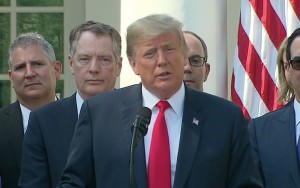
President Donald Trump said he might cancel NAFTA immediately, hoping to pressure Congress into approving its replacement deal.
Only a day after signing a new trade agreement with Mexico and Canada, President Donald Trump said he is now free to cancel NAFTA in a move that will create major problems for global automakers.
Trump, who is facing mounting political challenges at home, made his remarks to reporters as he prepared to return to the U.S. after the G-20 Summit in Bueno Ares. The remarks came after he had formally signed a new version of NAFTA with leaders from Mexico and Canada.
Trump’s goal in announcing the end of NAFTA is to put pressure on Congress to accept the new agreement with Mexico and Canada.
Congressional Democrats, including Nancy Pelosi, who is in line to become Speaker of the House in January, have criticized the proposed NAFTA replacement as not going far enough to protect the environment or workers in the U.S. Mexico.
(Trump claims China will cut auto tariffs. Click Here for the story.)
Even the elements of the pact touted by Trump’s negotiators as forcing companies operating factories in Mexico to raise wages of their employees won’t work without major changes to Mexican labor law, Democratic critics noted after the pact was signed.
The United Auto Workers, a longtime critic of NAFTA, raised similar concerns after the ceremonial signing of the trade pact in Buenos Aires.
Thus, even though its been signed, it still faces major hurdles, particularly in the U.S. where Congressional Democrats are cool to the proposed agreement.
Like Trump, Democrats from industrial areas in the Midwest have traditionally opposed NAFTA and have now gained more influence in Congress and with Trump’s help, for the first time in more than 25 years actually are in a position to kill the trade pact that has long been opposed by American trade unions, such as the United Auto Workers.
(Click Here for more about UAW attacking GM as Trump signs “new” NAFTA deal.)
In addition, the agreement itself is rather flimsy having been pushed to completion by a lame-duck Mexican government. Key issues such as tariffs on Mexican- and Canadian-made steel and aluminum remain unresolved and automakers said last week they still have concerns about the new agreement.
“We appreciate the administration’s continued efforts to modernize our nation’s existing trade agreements and help grow U.S. automotive manufacturing with new agreements like the USMCA,” said Matt Blunt, president of the American Automotive Policy Council.
“We remain concerned that the continued imposition of steel and aluminum tariffs on Canada and Mexico will undermine the benefits of the USMCA,” he added.
If Congress doesn’t approve the replacement agreement and Trump follows through on his new threat to scrap NAFTA, it could leave Mexican- and Canadian-made vehicles facing additional tariffs and regulations of various kinds.
(To see why new NAFTA faces a tough road to approval, Click Here.)
In addition, there is also serious legal and constitutional question, which could also take months to resolve, about if Trump actually has the authority to nullify NAFTA as he has proposed without Congressional approval. The trade pact was approved by Congress in 1994, and only Congress can remove it from the books, according to some lawyers and scholars.

